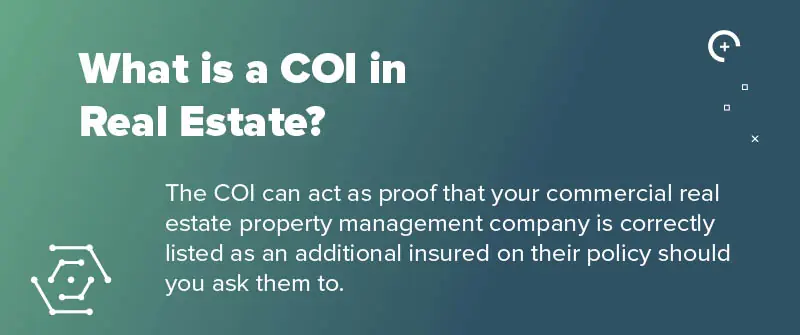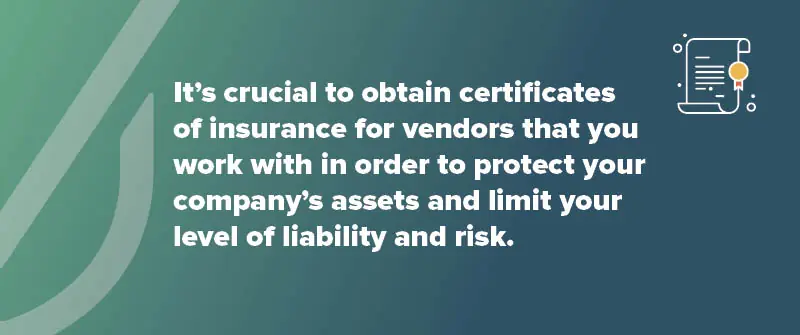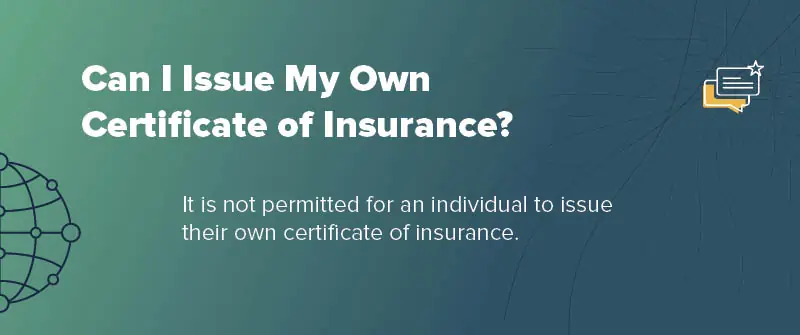
In the real estate industry, there are various cases where you may need to verify someone’s insurance coverage before hiring them. When a situation like this arises, you’ll use a COI, meaning a certificate of insurance services, to prove that they have the insurance policy and level of coverage that they say they do.
Therefore, if you’re working in real estate, you’ll need to know how to go about obtaining evidence of third-party insurance coverage, a process typically done through the collection of authoritative documents called certificates of insurance (or COIs). Follow along in our Certificates of Insurance 101 series. In this article, we’ll be discussing the importance of COIs in real estate.
What Is the Meaning of COI When Referring to an Insurance Policy?
A COI refers to a certificate of insurance, an official legal document. Its significance is related to insurance policies, specifically in that it can prove the existence of an insurance policy and provide the key details of one’s coverage. This could mean liability coverage, property insurance, or any other kind of relevant coverage a business owner might need.
This is important in many industries, including real estate, because businesses that hire contractors and other third parties or manage tenants without verifying their insurance protections can get involved in major headaches and costly situations due to underinsured claims.
What is a COI in Real Estate?
A certificate of insurance is a document that provides a summary of an insurance policy and proof of a policyholder’s coverage. Each one is particularly generated for someone with an interest in, or a requirement for, the policy, such as a property manager. Specifically, you should ensure that your tenants, vendors, subcontractors, and other third-party service providers have adequate insurance coverage in place. There are various cases where COIs are important in real estate in order to verify third-party coverage and minimize your business’s exposure to downstream risk. For example, you may need to verify property insurance, workers compensation insurance, commercial general liability insurance, or another specific type of policy.
Because a COI is an official insurance document that can only be generated by a policyholder’s insurance agent, it can act as certified proof of their coverage. Further, it can act as proof that your commercial real estate property management company is correctly listed as an additional insured on their policy should you ask them to. Doing so protects your organization from the risk created by the negligent acts of your tenants, employees, subcontractors, service providers, vendors, etc., by extending their coverage to you.

What Is a COI in Legal Terms?
From a legal perspective, a certificate of insurance is often used to verify that a party involved in a business transaction or contractual agreement has the needed type and amount of insurance coverage to address potential risks and liabilities that could stem from their work. In short, a COI proves that the vendor in question has valid coverage from an insurance company. COIs confirm that a policyholder has met their obligations to maintain insurance as specified in your contract or by other regulatory insurance requirements.
What Does COI Mean in Real Estate?
A COI in real estate means that you’ve rightly ensured that your third parties are insured. The purpose of COIs across all industries is to make absolutely certain that a contractor, vendor, or other third-party service provider carries the coverage that they claim to. A COI will outline what the insurance covers, as well as coverage limits, and more. COIs are often required in real estate transactions to ensure that various parties, such as lenders, landlords, tenants, and property managers, have the necessary insurance coverage to protect against potential liabilities and risks associated with the property.
An example of when a COI would be needed in real estate is in rental agreements. Property owners and landlords frequently require their tenants to obtain renter’s insurance and provide an associated COI as part of the rental agreement. This particular COI would demonstrate that a tenant had obtained the necessary coverage to protect their personal belongings. It also would protect the landlord or property owner, who otherwise could be held financially liable in the case that the tenant filed a claim against them for the loss.
What Does COI Mean in Contracting in Real Estate?
It’s crucial to obtain business certificates of insurance for vendors that you work with in order to protect your company’s assets and limit your level of liability and risk. In real estate development, when construction or renovation work is being carried out on a property, various contractors, subcontractors, and construction companies may be involved. Property owners should require contractor certificates of insurance to ensure that the contractors have the necessary insurance coverage, such as general liability insurance and workers’ compensation, to cover potential accidents, property damage, or injuries that could occur during the work.
Similarly to the case of the tenant mentioned above, this insurance verification doesn’t just protect the contractors—it also ensures that the property owner and real estate business are protected from potential liability claims. It’s also extremely common for construction contracts or lease agreements to require contractors to maintain specific types and levels of insurance coverage. A COI provides proof of compliance with these contractual requirements, ensuring that everyone is correctly protected.

Why Do You Need A COI For A Commercial Real Estate Property?
Certificates of Insurance play a huge role in mitigating risks for landlords, property owners, and tenants alike. COIs serve as firm evidence that the parties involved in a lease agreement or property transaction possess up-to-date and valid insurance coverage. COIs are crucial for property owners because they provide assurance that tenants have adequate liability and property insurance. This safeguards owners from any potential legal or financial liability due to damages, accidents, or incidents that happen on the premises. COIs also describe policy details and coverage limits, which allows property owners to ensure that tenants have appropriate insurance for the property’s specific requirements.
Tenets also benefit from COIs because they can easily demonstrate that they care in compliance with the terms of a least. This creates a better relationship between tenants and landlords and minimizes the potential for any legal or other issues.
Why Do Companies Ask for Certificates of Insurance?
Companies ask for certificates of insurance for a number of reasons. COIs are typically requested in order to verify insurance coverage, establish compliance with contractual obligations, or assess potential risks and liabilities. This includes understanding what and who the insurance covers, as well as all the essential details of the insured party.
COI certification collection helps ensure that parties involved in business partnerships have taken appropriate measures to address potential claims or damages that could come up during the course of their business activities—and as we all know, the fewer claims headed your way, the better.
What Is a Certificate of Insurance for Subcontractors in Commercial Real Estate?
Again, it’s important to collect certificates of insurance for contractors and subcontractors that you work with on your property. For subcontractors, a COI is a vital document that shows proof of their insurance coverage for a relevant construction project. This evidence is commonly requested from and required of them, not just by property owners but also often by general contractors and project managers. Sometimes, a subcontractor cannot even bid for a job without providing proof of their coverage beforehand.
By obtaining and reviewing COIs from your subcontractors, you, as the hiring party, can verify that their insurance is current and sufficient to protect against accidents, injuries, property damage, or other potential claims that may arise during your project. This process also aids businesses in getting their projects completed on time and within budget when they don’t have to worry about unforeseen costs and delays associated with accidents. We’d go even further to say that it’s part of your due diligence as someone working with subcontractors to ensure that they always have the proper certificate of insurance for events in place.
Why Would a Business Request a Certificate of Insurance?
Ultimately, COIs confirm that a policyholder has met their obligations to maintain insurance coverage as specified in the contract you’ve created for them or by other regulatory or state-mandated insurance requirements. They provide a level of transparency, assurance, and peace of mind that adequate insurance coverage is in place, which can be important both for compliance with legal and contractual requirements and for your overall risk management strategy. Businesses operating in the realm of real estate should get used to COIs or else prepare to suffer the consequences of costly and completely unnecessary claims.
Can I Issue My Own Certificate of Insurance?
It is not permitted for an individual to issue their own certificate of insurance. Because they are important legal insurance documents that act as evidence of an entity’s coverage, it is not okay for just anyone to produce them. Only a certified insurance company or provider—the one granting coverage to a policyholder through an active policy—can generate a certificate of insurance for real estate or any other industry. One important way that myCOI can assist with your COI tracking and verification efforts is by ensuring the validity of a received insured’s certificate so that you can avoid fraudulent, self-created COIs.

How to Get a Certificate of Insurance for Real Estate
Since we’ve now covered that you can’t simply generate your own COI, it follows that there is a more formal, standardized process for how to get a certificate of insurance. Here is how the process will typically go (as the property manager, hiring manager, or any entity who needs to verify a third party’s coverage):
- Write out why you need a COI from the vendor, including which kind of policy you need evidence of, your required policy limits, and any other provisions you expect from them, such as an additional insured endorsement or to be named as a loss payee on the policy.
- Send this information, as well as your contact information and the instruction for you to be named as the certificate holder on the document, as an official COI request. Most people send this digitally these days, both for ease and speed of communications and to maintain a painless paper trail for their internal recordkeeping.
- Sit back and wait while your contractor works with their insurance provider to generate the COI! (For them, this part of the process looks like this: They’ll receive your COI request and visit their insurance provider through an in-person appointment or certificate of insurance online portal. They’ll work with their insurer to make certain that their insurance meets your needs or make changes to the policy to make it so that it does. Then, once the insurer generates the certificate for them, they’ll deliver it back to you.)
- Receive the COI from your vendor and verify that it is accurate, representative of the policy and policyholder you are verifying the coverage of, and that the policy and certificate meet all of your requirements as laid out in your official request. Learn more about how to verify insurance coverage.
- Keep a copy of the COI in your records (we recommend doing so for at least five years, just in case of future claims!). Make sure to note internally or through your designated COI management software when the policy is set to expire so you can reach out to them to renew their coverage before it lapses. There’s no point in going through all of the trouble of making sure that someone is insured just for them to lose coverage when it matters most.
Who Is the Certificate Holder of COI for Liability Insurance?
On any COI, the certificate holder is the entity that requests evidence of someone’s coverage. You will actually be listed on the official document as a way of linking you to the request and to information about the policy. The “job” of a certificate holder is to receive the COI and validate that it meets their needs for the job or contract in question.
How myCOI Can Help With Your Real Estate COI Management
myCOI brings certificate of insurance management to a whole new level. We are a state-of-the-art insurance certificate management platform that can help you streamline your efforts, improving your efficiency when it comes to compliance and reducing your overall level of financial risk.
We handle the everyday tasks of managing certificates of insurance and protect your company against the risk of underinsured claims, costly litigation, and failed audits.
Learn how we help real estate owners with their COI management—or book a demo today to see for yourself how it works.